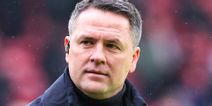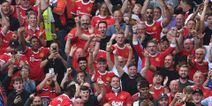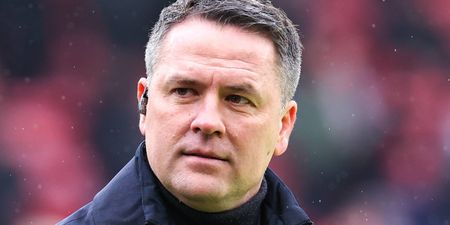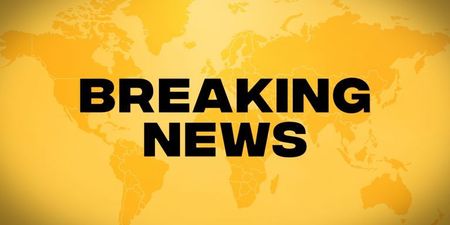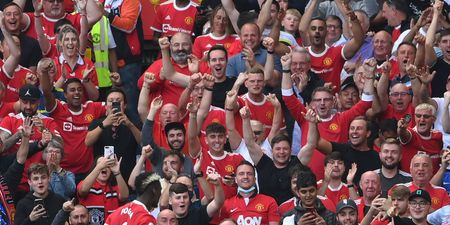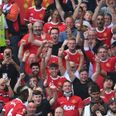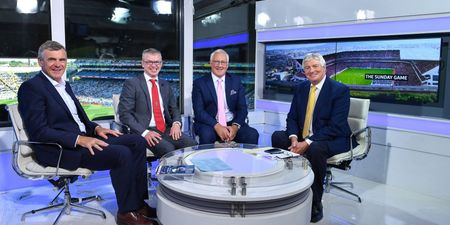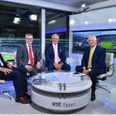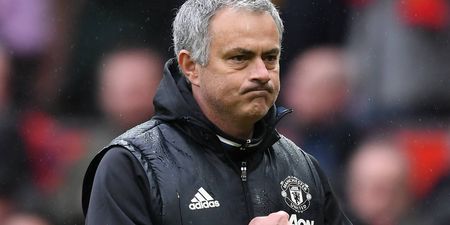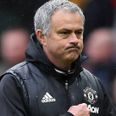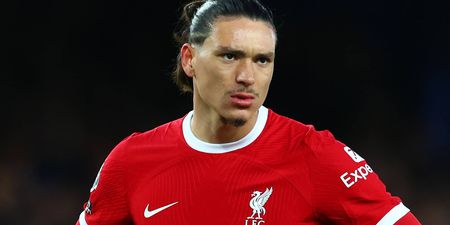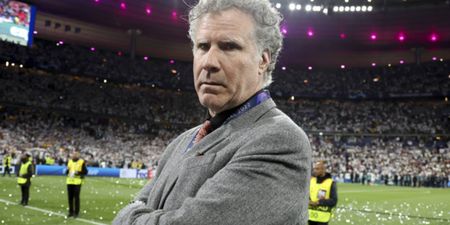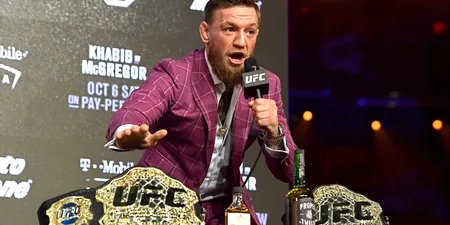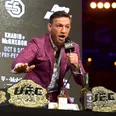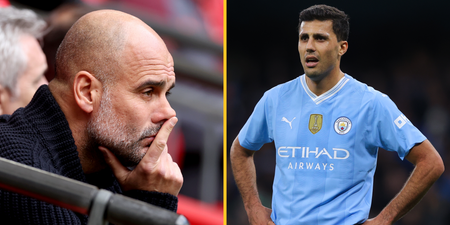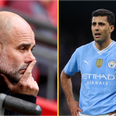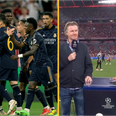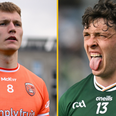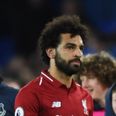In one of his most revealing interviews to date, we caught up with John Delaney to talk about the departure of Trap, appointing a new manager, Roy Keane and the future of Irish football.
It’s been a tough week for Irish football. After two limp performances against Sweden and Austria our dreams of going to the World Cup next summer are over, we’re currently manager-less and we’ve slumped to 59th in the FIFA World Rankings, the lowest ever in our history.
Despite that, FAI Chief Executive John Delaney is optimistic about the future of Irish football and in one of his most revealing interviews to date, he spoke to JOE about Trapattoni, what he’s looking for in a new manager, Roy Keane and some of his best memories in his long association with Irish football.
JOE: First of all John, was the decision to let Giovanni Trapattoni go something that had been coming for a while or was it made on the back of the results against Sweden and Austria?
JD: Well, it’s been a traumatic few days with the two losses. I think a lot of people went into the games with optimism because we were level with Sweden and Austria and if we got four or six points out of those games we would have been in with a great chance of finishing second and would have been in play-off territory.
After losing the two matches there was a huge inevitability about it that Giovanni and Marco were going to go their separate ways from the association and in fairness when we met them yesterday (Wednesday) morning they were of the same view, having slept on it overnight they knew that they had taken the team as far as they could have.
“There were a few tears, I don’t mind saying that”
They were in charge for three campaigns, two went well, the World Cup campaign that ended with the Henry handball and qualifying for our first tournament in 10 years in their second campaign. This was an extremely different campaign and I think it was appropriate that we parted company but it was done amicably and it was very important that it was done amicably.
JOE: It still must have been difficult given your close relationship with the manager in the last number of years?
JD: There was a lot of mixed emotions. I love the Irish soccer team, I’ve supported them since I was a young boy and I’ll support them when I leave the job. I followed them away from home in my late teens and in my 20s and when your team is out of the World Cup that’s a blow; there was huge emotion involved.
Then you’ve got to deal with a manager who is a legend of European and World football and you want it dealt with correctly. I’ve worked with Giovanni for five and a half years but we all realised that there needed to be clarity brought quickly to the situation; there was no point in dragging it on.
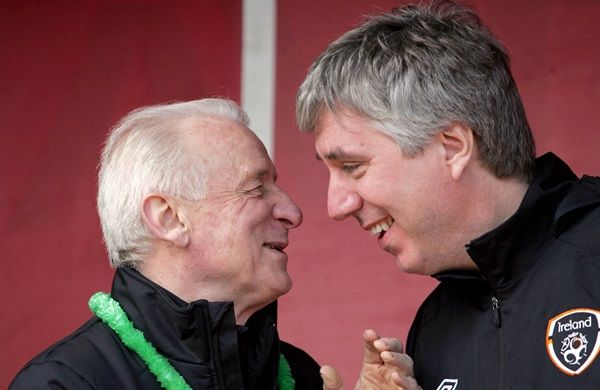
Delaney and Trap in happier times
There were a few tears, I don’t mind saying that, it was the end of an era and the end of a time the association worked with Trapattoni and Tardelli but I must say I’m very, very pleased there was friendship at the end of the meeting. Even today there have been some text messages, nothing to do with work, just wishing each other well.
That’s rare in football and what’s rare is wonderful and it’s rare in football that a manager leaves and it’s done in an amicable way and I’m certainly pleased about that side of it. But I must say that Ireland not going to Brazil, not in my role with the FAI, but as an Irish supporter hurts and it will do for a long, long time.
JOE: Attention now turns to a new manager. Is the priority to get a new man in in time for the remaining World Cup qualifiers or are you prepared to wait that bit longer if that’s what it takes to get the right man in?
JD: I think it’s important to get the right man, to get the right person in, that’s the first thing. It would be preferable if we get the manager in for the two games in October but it’s not a must-do. We have a year now until the European qualifiers next September and while it would be nice to have somebody in for the rest of this campaign it’s not a must-do.
What is a must-do is to get the right person in who can get the best out of our players and ensure that the Irish team get to France in 2016. You go back to Poland last year when you had 32,000 Irish fans following the team, the tricolour being raised before matches, Amhrán na bhFiann being sung, it was brilliant stuff as an Irishman abroad to see that colour and that Irishness and we want that in France, we want sixty, seventy, eighty thousand Irish people following their country, going to Paris or wherever it is in France following the Irish team in a major tournament.
That has to be the main objective, it’s a must achievement for Ireland.
JOE: What are the main credentials you will be looking for in the new manager?
JD: Well it’s slightly easier in the sense that 24 teams qualify for the Euros this time as opposed to 16, but to get the best out of our players, that has to be the main objective.
We’ve got a good set of young players, the Colemans, the Longs, the McCarthys, the Wilsons, the Robbie Bradys, the Shane Duffys, the Jeff Hendricks, I mean there are good young players coming through and we need a manager who will get the best out of them, who will lift their confidence and win vital matches to get us into major tournaments; they’ll be the key characteristics for sure.
There were issues with Giovanni in terms of going to matches and communication issues that have often been spoke about and I think it’s important that the next manager is a visible presence at matches in England, no question about it, that’s something we’ll be looking for,
Most importantly and above anything else is that the new manager gets the best out of our players and gets us to the Euros in 2016.
JOE: It was fairly clear that the mood of the Irish supporters had turned somewhat negative after the Euros and that people were speaking with their feet and often not turning up for matches. What can you do to address that and will it be in the remit of the new manager to play a style of football that will attract the crowds?
JD: Well, you’d want your manager to have a team playing attractive football; that’s what we all want, but results are important too. It’s a mix of playing attractive football but also achieving results, they’re interlinked if you like. Of course you want the stadium full with fans chanting and if you have that while the team are playing attractive football all the better.
There is a balance between attractive football and getting the results to get us to the Euros and to the World Cups. It’s a funny one, I followed Ireland in the Charlton era and the football wasn’t great but by God did we love it when we got great results away from home, when we beat Scotland away, when beat England in Stuttgart I was there and when we beat Italy in Giants Stadium I was there.
Those were great moments and they weren’t achieved with the best style of football but it got great results. I always prefer to see a lovely style of football, the games that stick in my mind are when Spain beat us on penalties in the 2002 World Cup but we played Spain off the park that night. I remember being in Hannover in ‘88 when we played Russia in one of our greatest performances, we were unlucky with a 1-1 draw because we played them off the park for 70 minutes and they ended up in the final.
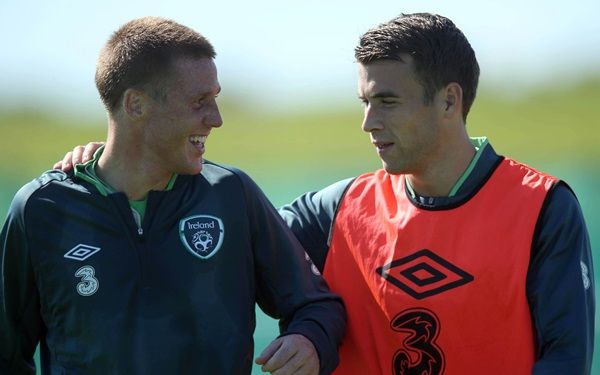
Delaney has great faith in the likes of Seamus Coleman, James McCarthy and the new breed of Irish footballers
In Paris we played wonderful football that night; we can do it and we’ve proved we can do it on occasions and it’s not fair to suggest that we can’t play football; of course we can. Players like Coleman, Wilson and McCarthy are all good footballers and can play the game.
Preferably you’d do it with an attractive brand of football but results are as important because they ultimately determine the opinion of a manager and they ultimately determine attendances because people will turn up to watch a team that’s winning and I hope the new man will achieve that for all of us.
JOE: Trapattoni and Tardelli often made the point that they were working with a limited bunch of players but you obviously don’t agree?
JD: I’m of the view that we have good footballers, I have to have that view because they play in the Premier League. There’s a lot of talk about how we don’t have top players in top teams but John O’Shea, for example, played at the highest level with Man United for years.
Everton finished sixth in the Premier League last year and they’ve got McCarthy, Coleman and Darron Gibson, who I presume will make his way back to Irish football now having had issues with previous manager. Aiden McGeady’s a good footballer.
“People like my grandfather and many people’s grandfathers fought for the tricolour and fought for the right to represent Ireland”
These players are well able to get the ball down and pass it and they’ve proved that in previous matches. Apart from the Spains of this world and a few others, there’s no great shakes in international football. We’re going to finish fourth in our group but on our day I think we’re better than Austria most times out of ten.
We’re not far away, we’ve never been far away in the last three campaigns, we played France off the park in Paris, we got to the Euros even if it didn’t go well for us and although we’re going to finish fourth in this group we’ve never been far away apart from against Germany at home when we were hammered.
JOE: Speaking of the current squad, will there be an onus on the new manager to reach out to some of the players who, for one reason or another, haven’t featured for Ireland in recent years, the likes of Darron Gibson, Andy Reid and Anthony Stokes, for example?
JD: That’s for the new manager to decide but the way it should be is that every Irish manager is available to the new manager and that there are no Irish players in exile; that’s what we’d like and that’s what everyone in Ireland would want. Players who may not have made themselves available will hopefully do so for the new manager, who can then pick a squad anew to get on with it.
It’s always disappointing when players don’t make themselves available because you’ve only got one country. You can change your club but you can only play for one country. People like my grandfather and many people’s grandfathers fought for the tricolour and fought for the right to represent Ireland and every player should make themselves available to play for their country irrespective of whatever fallouts they may have had.
JOE: The likes of Martin O’Neill, Mick McCarthy and Roy Keane have already been linked with the job. Can you confirm that all of these are on the FAI’s radar?
JD: I’ll start from the position that I think it’s an attractive job. It’s easier to qualify for the Euros than it has been, we’ve got some very good young players and Denis O’Brien has come in behind us and will be supporting the project for at least the next two years so the financial package is attractive.
I won’t go into names but already today contacts have been made by agents telling us to keep certain names in mind if we’re looking to find a manager and they would be pretty well known names in international football if I can phrase it that way.
Over the next week or so, we’ll work out a timescale and a job description for who we want but there are plenty of names out there, whether they’re Irish, English or European.
It’s the nature of how these debates go, everyone will have an opinion, Trap came from left field very late in the day and there were six or seven favourites to get it on different occasions and that’s how it will probably go this time until we make decision who it is and who gets the job.
JOE: Is there a preference for an English-speaking manager after the communication difficulties that Trap experienced at times?
JD: There’s been a mixed view about the communications issue within the squad under Trapattoni because I can say no player ever came to me while he was in the squad and said they had an issue with it. It’s obviously better if they speak English because it’s easier to communicate but I think the legendary status Trap had more than compensated for any potential communication issues he might have had.
He managed at the highest level for many years and by and large he succeeded for us, especially in the first two campaigns; the third campaign was a disappointment and we all recognise that.
JOE: Is there a need to be more in touch with grassroots football and the domestic game in Ireland than Giovanni Trapattoni, who was often criticised for claims that we have no league here?
JD: I don’t think Giovanni meant to say that there was no league in Ireland, I think that was probably phrased incorrectly from his side. It’s fair to say that the league has never produced, certainly in more recent times, as many of our international squad as it right now.
I think 11 of the squad that played in the World Cup qualifiers came from the League of Ireland, the Wesley Hoolahans, the Shane Longs, the Kevin Doyles, the Seamus Colemans, the James McCleans, the David Fordes, you can just rattle them off at this stage.
The league has made a huge contribution to the international team and I think it’s important that the manager, if he can, can be seen to attend games domestically, can be seen to work with the coaches and while that’s not the primary role of the manager, it’s also important that they are seen to be connected or liasing with the managers and spotting new players coming through.
Ultimately, our top players do play in England and Scotland, or Russia in Aiden McGeady’s case and that’s where the manager has to put most of his focus, but also to be aware of promising players coming through our domestic league.
JOE: Going back to Roy Keane in particular, it’s known the two of you have had a difficult relationship in the past. Would you personally have any problem working with him?
JD: I don’t think I should comment on any one individual because if I comment on Roy Keane, or Martin O’Neill or Mick McCarthy, I’m ruling people in and out.
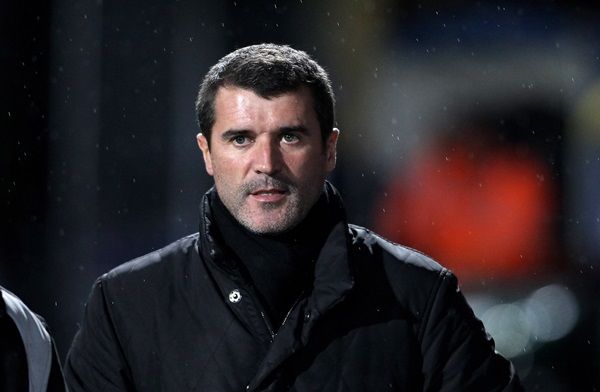
Delaney wouldn’t be averse to working with Roy Keane despite their chequered past
I’ll put it to you this way, the view of the FAI board is to get the best person. Whoever the best person is will manage Ireland and I’ll work with them for the good of Irish football. If the board believe the best person is there I wouldn’t care who it is in terms of working relationships, I’d make sure we work together to get the Irish team to the Euros in 2016 which is really important.
JOE: We know the FAI have had issues with debts of late, will that affect your ability to recruit a manager or will Denis O’Brien’s involvement help in that regard?
JD: Denis has been sensational, he’s been absolutely outstanding. At your lowest moments you know who your friends are and who your supporters are and when Denis spoke to me yesterday and said ‘I’m in for the next two years’, that’s a wonderful fillip and wonderful positivity in what had been a difficult few days.
“Whoever the best person is will manage Ireland and I’ll work with them for the good of Irish football.”
Denis’ involvement means we’ll be able to go into the market and, if required, be able to offer a financial package to hopefully get a top manager who will be able to get the best out of our players.
JOE: Do you personally have as much enthusiasm for your own job as you ever had?
JD: I’ve said this many times. I’ve visited 1,700 clubs or so over the last eight or nine years, I’ve dedicated my time and my life to the grassroots, I firmly believe in Irish football and I think that once you get the foundations right, the chimney will look after itself, the chimney in this case being international football.
I have the energy and the drive and the day I don’t have that and the support from the board and from the grassroots I’ll call it a day. There are new challenges ahead with a new manager, a new academy in Abbotstown and working with Ruud Dokter, our high performance director and with the support of the grassroots and the board I’m confident we’ll see those through.
JOE: Finally John, the mood amongst the Irish soccer community is quite low at the moment, what do you want to say to the average Irish soccer fan out there to give them cause for optimism in the future?
JD: Listen we’ve been through some tough times and some good times. A little over a year ago there was great hype and great expectation before the Euros and some people felt we were going to get to the quarters or the semis or even go further.
We’re never as bad as we are today and we were never as good as we were with those sorts of expectations. It’s in our culture at times, it’s like the Celtic Tiger, we were great at business and nobody could beat us business-wise and then the recession comes and we’re hopeless. We’re somewhere within those parameters and we should keep within those parameters.
I would urge the Irish public, once the manger has been appointed, to get behind him and get the positivity going so he can work in a positive environment and that when we’re talking in two years’ time, we’re talking about going to the Euros on a wave of optimism and of positivity with eighty thousand Irish people going to France and being proud of their football team.
Since I was a very young lad I’ve always been proud to be an Irish soccer supporter and there is never a prouder moment than to go abroad, to see the tricolour raised and to sing Amhran na bhFiann and hopefully that will be the case in a few years’ time.

